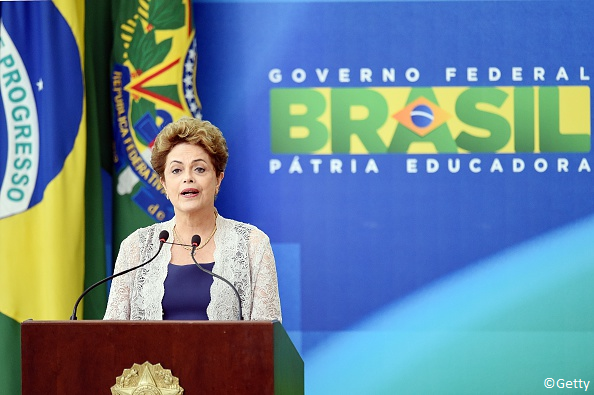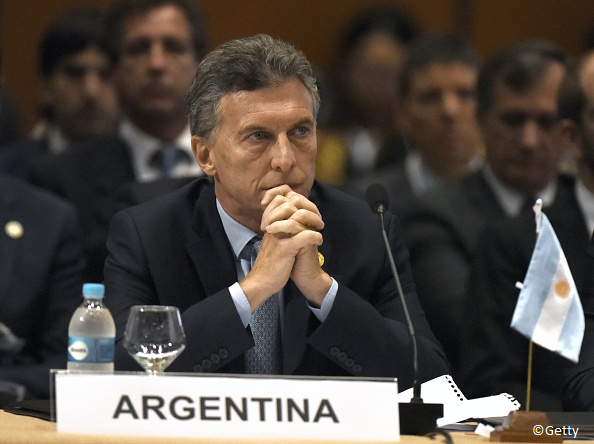A peculiar role reversal is taking place between South America’s largest economies.
Argentina, long the region’s financial pariah, is coming in the from the cold following the election of a new president who has pledged to revive the economy, make amends with holdout creditors and regain investors’ trust.
Meanwhile, Brazil, the once high-flying darling among emerging market investors, has seen its fortunes come crashing down.
The country’s stock, bonds and currency struggled for much of 2015 amid a deepening recession and a sweeping corruption scandal at state-controlled oil company Petrobras that prompted the arrest of top lawmakers and businessmen.
But the crisis in Latin America’s largest economy took a turn for the worse in December after Fitch joined Standard & Poor’s in stripping Brazil of its hard-won investment grade rating.
An impeachment process to oust President Dilma Rousseff (pictured below), coupled with the departure of well-respected finance minister Joaquim Levy, have further raised questions about whether the country can still govern itself.
Stephen Jen at SLJ Macro Partners summed up Brazil’s dysfunction as follows:
“The resignation of the very competent FinMin Levy suggests that the government can no longer support the goal of a fiscal surplus, and that competent technocrats are being replaced by politicians and policies are driven more by politics. Brazil’s continued slide into the abyss reminds me of what happened in Indonesia during the Asian Crisis. Like Indonesia, Brazil relies on commodity prices, is populous, but has always been more fragile than the headline macro statistics suggest.
…The combination of the Fed and China will remain an unpalatable cocktail for Brazil. There is no reason to think January 2016 will be different from December 2015.
…My guess is that the BRL will weaken again, toward 5.00 in the first part of 2016.”
Contrast Brazil’s spiral with the growing sense of hope about Argentina.
If Brazil is starting to look more like Argentina in 2001, then Argentina, with the election of President Mauricio Macri (pictured) and his promise of more orthodox economic policymaking, is starting to look like Brazil in 2002, when Luiz Inacio Lula da Silva, a former trade-union leader turned politician, won the presidency by combining promises of social justice with sensible economic policies.
Granted, Mr da Silva also had luck on his side, as his reign coincided with the start of a China-driven commodity boom that would help Brazil’s economy grow an average of 4 per cent per year between 2003 and 2011.
That boom has since turned to bust. But Mr Macri has nonetheless made a positive start to undoing over a decade of populist macroeconomic policies that left Argentina with an overvalued exchange rate, runaway inflation and precariously low foreign reserves.
Although lifting capital controls within days of taking office devalued the currency – the official peso exchange rate fell more than 26 per cent to 13.3 per dollar – there is little sense of panic in the market because the move is understood as a key, albeit painful, part of Mr Macri’s plan to reform Argentina’s ailing economy.
As analysts at Capital Economics noted:
“It’s still early days but the fact that the new administration have tackled the most obvious distortions in Argentina’s macro-policy framework so soon after the election is encouraging.”
Since its devaluation on December 27, the peso has held up surprisingly well against the dollar, strengthening more than 2 per cent to over 13 per dollar. During the same period, the Brazilian real has fallen another 4.2 per cent.
Make no mistake, Argentina’s road back to investors’ favour is long and has a litany of challenges – the most immediate of which will be containing any inflation that could come from the weaker peso, rebuilding the country’s foreign reserves and reversing the economic slump.
But for now analysts and economists are cautiously optimistic.
Gabriel Torres, an analyst at Moody’s, said the initiatives that Mr Macri has taken so far are “broadly credit positive” for Argentina’s sovereign credit rating (Caa1 – deep junk) and “should boost the economy in the long run.”
Elsewhere, Bank of America Merrill Lynch has raised its recommendation for the country’s bond investments to “overweight”.
During the 2014 World Cup, Argentina surprised everyone by making it to the finals while Brazil – the host country and a favorite to win – suffered a humiliating 7-1 defeat at the hands of Germany. It’s early days but if Mr Macri makes good on his promises, Argentines could soon have something else to gloat about.

